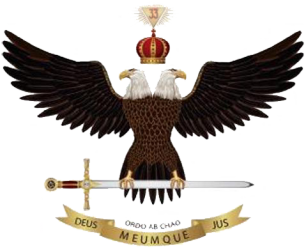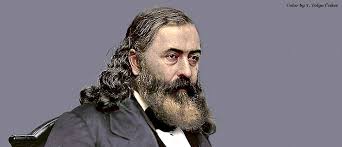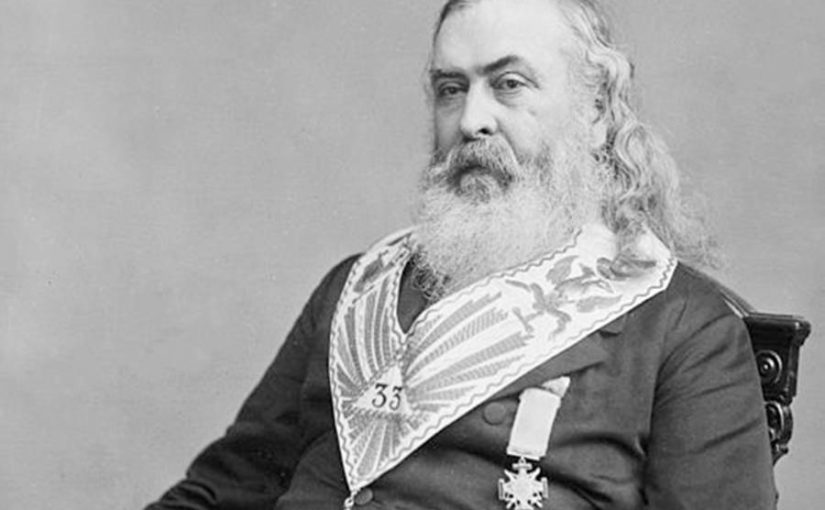Albert Pike[1] was an eminent American Freemason who practiced Law [2] before joining the Confederation Army during the American Civil War and reaching the grade of General. As a Freemason, he was extremely active in developing rituals of the Scottish Rite and in 1859 he reached the 33° grade in the Southern American Jurisdiction. Pike held the office of Grand Commander of the Order until 1891, the year of his death.

To these days he is , in some respects, still seen as a controversial figure for unproven accusations of having also belonged to a world famous far right American secret society. Irrespective of whether it may be true that he was part of such a cult, the power of Pike’s skillful analytical mind is unquestionable and it is the reason behind my decision to print the following extract from his work “Morals and Dogma”[3]. His words ring true then as well as today, 150 years on. Judge for yourself.

Two forms of government are favorable to the prevalence of falsehood and deceit. Under a Despotism, men are false, treacherous, and deceitful through fear, like slaves dreading the lash. Under a Democracy they are so as a means of attaining popularity and office, and because of the greed for wealth. (...) When office and wealth become the gods of a people (...) and fraud becomes the highway to (wealth) , the land will reek with falsehood and sweat lies (…). When offices are open to all,(men of) merit and stern integrity (…) will attain them only rarely and by accident. To be able to serve the country well, will cease to be a reason (for selecting) the great and wise to render service. Other qualifications,less honourable, will be more available. For example being able to : -adapt one's opinions to the popular humour and defend, apologize for and justify the popular follies; -advocate the expedient and the plausible; -caress, cajole, and flatter the elector; -beg like a spaniel for his vote; -profess friendship for a competitor and stab him by innuendo -set on foot that which at third hand shall become a lie (...) Who has not seen these low arts (…) put into practice and becoming general, until success cannot any more be surely had by honourable means? The result being a State ruled and ruined by ignorant and shallow mediocrity (…) vain of a school-boy's smattering of knowledge. The faithless and the false in public and in political life, will be faithless and false in private. The jockey in politics (..) is rotten from skin to core. Everywhere he will see first to his own interests (…). His ambition is ignoble, like himself and therefore he will seek to attain by ignoble means (...) land, money, or reputation. At length, office and honour are divorced. The place that the small and shallow, the knave or the trickster, is deemed competent and fit to fill, ceases to be worth of the ambition of the great and capable (…). Then the habits of unprincipled Law Court advocates are naturalized in the Senates, where pettifoggers wrangle when the fate of the nation and the lives of millions are at stake. States are even begotten by villainy and brought forth by fraud, and rascalities are justified by legislators claiming to be honourable. Then contested elections are decided by perjured votes or party considerations; and all the practices of the worst times of corruption are revived and exaggerated (…) It is strange that reverence for truth,that manliness and genuine loyalty and scorn of littleness and unfair advantage , and genuine faith and godliness and large-heartedness should diminish, among statesmen and people, as civilization advances (…) There is a general feeling of satisfaction when a great statesman is displaced (…),or (…) is unfortunate and sinks from his high estate. It becomes a misfortune, if not a crime, to be above the popular level. We should naturally suppose that a nation in distress would take counsel with the wisest of its sons. But, on the contrary, great men seem never so scarce as when they are most needed. And small men never so bold to insist on the infesting place, as when mediocrity and incapable pretence and (...) and showy and sprightly incompetence are most dangerous. Fraud, falsehood, trickery, and deceit in national affairs are the signs of decadence in States and precede convulsions or paralysis. To bully the weak and crouch to the strong, is the policy of nations governed by small mediocrity. The tricks of the canvass for office are re-enacted in Senates. The Executive becomes the dispenser of patronage, chiefly to the most unworthy; and men are bribed with offices instead of money, to the greater ruin of (all). The Divine in human nature disappears, and interest, greed and selfishness takes it place.
[1] Born in Boston, Massachusetts, U.S. 29.12.1809 – Died in Washington D.C. , U.S. 2.04.1981
[2] He was admitted to the bar in 1837
[3] The full title of the book is Morals and Dogma of the Ancient and Accepted Scottish Rite of Freemasonry and the work was published and reprinted several times over since 1871.
- Influencia de la Masonería en Chile - April 29, 2024
- Pomegranate in Freemasonry – its significance - March 11, 2024
- Inns and Innkeepers’ incidence in Freemasonry expansion - February 28, 2024

